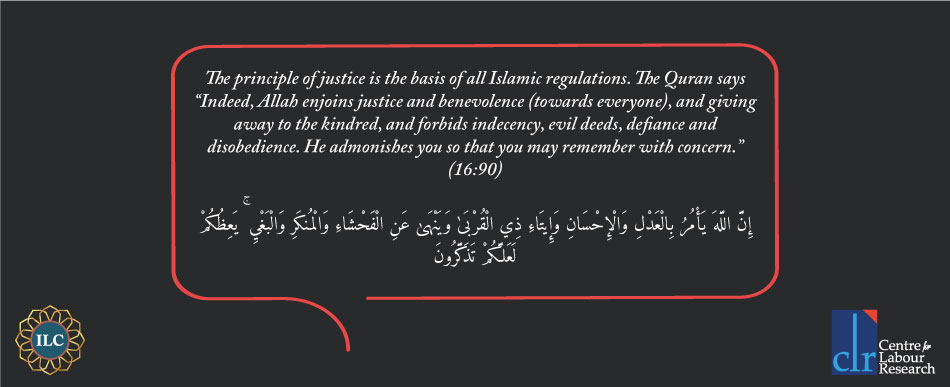General Provisions

Title and Commencement
[1] The principle of justice is the basis of all Islamic regulations. The Quran says “Indeed, Allah enjoins justice and benevolence (towards everyone), and giving away to the kindred, and forbids indecency, evil deeds, defiance and disobedience. He admonishes you so that you may remember with concern”. (16:90)
- This Act shall be cited as the “Islamic Labour Code” and shall come into force at once.
- The purpose of this Act is to establish a legal framework for the minimum conditions of employment, labour relations, labour inspection, dispute resolution and provision for fundamental labour rights at work including health and safety at the workplace, following the provisions of Quran and Sunnah.[1]
- The Act shall apply to all workers, irrespective of the status of employment (part-time or full-time; independent contractor or employee) or sector of employment (public or private sector).[2]
[1] The principle of justice is the basis of all Islamic regulations. The Quran says “Indeed, Allah enjoins justice and benevolence (towards everyone), and giving away to the kindred, and forbids indecency, evil deeds, defiance and disobedience. He admonishes you so that you may remember with concern”. (16:90)
إِنَّ اللَّهَ يَأْمُرُ بِالْعَدْلِ وَالْإِحْسَانِ وَإِيتَاءِ ذِي الْقُرْبَىٰ وَيَنْهَىٰ عَنِ الْفَحْشَاءِ وَالْمُنكَرِ وَالْبَغْيِ ۚ يَعِظُكُمْ لَعَلَّكُمْ تَذَكَّرُونَ
Another basic principle about legislation is that it should make the lives of its subjects easier rather than complicating the matters. Laws and regulations must be practicable. Both the parties, i.e., workers and employers, should be free within legislative bounds to agree on various issues. The Quran declares that Allah “has not laid upon you any hardship or constriction (in the matter of) Din (Religion)”. (22:78)وَمَا جَعَلَ عَلَيۡكُمۡ فِى الدِّيۡنِ مِنۡ حَرَجٍ
[2] Laws specify the rights and obligations of various parties. The Quran says: “And We have slung every man’s record of deeds (rights and obligations: Dhimma) around his neck”. (17:13)وَكُلَّ إِنسَانٍ أَلْزَمْنَاهُ طَائِرَهُ فِي عُنُقِهِ
